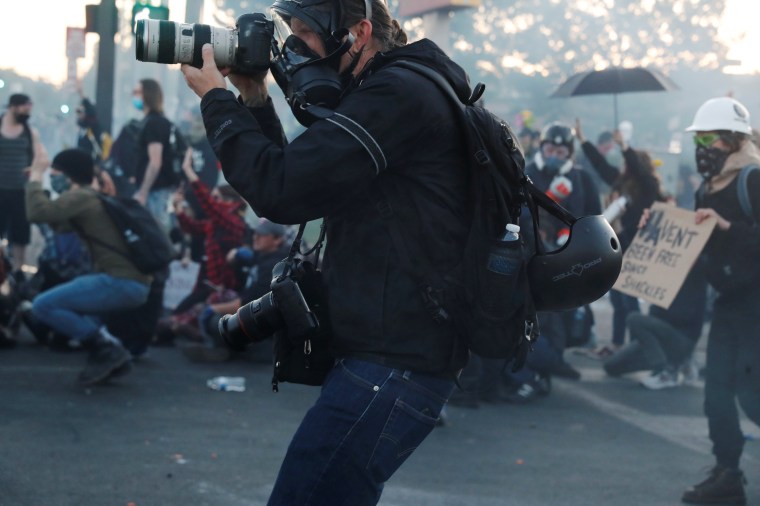The Torch is a weekly newsletter from the Committee to Protect Journalists that brings you the latest press freedom and journalist safety news from around the world. Subscribe here.
Since protests against police brutality erupted across the U.S. on May 26–sparked by the death of George Floyd, a black civilian, in Minneapolis police custody–there have been over 400 U.S. incidents of press freedom violations reported to the U.S. Press Freedom Tracker, of which CPJ is a founding partner. In a new Op-Ed, CPJ Advocacy Director Courtney Radsch argues that law enforcement must be held accountable, as they have perpetrated the majority of attacks against journalists at protests.
CPJ and scores of domestic and international groups sent a letter to President Trump, and separately to U.S. governors, calling on them to speak out forcefully against attacks on journalists covering protests. Last week, CPJ’s board sent a rare letter to U.S. governors, mayors, and police chiefs calling on them to halt assaults on journalists.
Outside the U.S., following an announcement from the Cameroonian military last week that journalist Samuel Wazizi died in custody in August 2019, CPJ joined a call for the Cameroonian government to account for the journalist’s death. It calls for an investigation into Wazizi’s treatment while in custody, and demands that those responsible be held accountable.
Global press freedom updates
- Nigerian journalist held under cybercrime act for COVID-19 coverage; separately in Nigeria, a journalist is in hiding after police arrest and question reporters on his whereabouts
- Burundi court rejects imprisoned Iwacu journalists’ appeal
- Brazilian Senate to vote on ‘fake news’ bill
- Anti-terrorism legislation threatens press freedom in the Philippines
- Office of independent TV station 3 Kanal firebombed in Kyrgyzstan
- Turkish police arrest two journalists in espionage investigation
- Palestinian security forces arrest journalist Sami al-Saie in the West Bank
- Journalists assaulted, detained while covering COVID-19 protest in Iraqi Kurdistan
- Indonesian journalist held since early May on criminal defamation charge
- Slovenian reporter Eugenija Carl receives threatening letter with white powder
- Bolivian journalist takes leave of absence citing government intimidation
- Chilean Supreme Court orders Radio Bío Bío to remove content from website
- CPJ joins call to strengthen EU legislation on dual-use technologies
Spotlight

Starting June 11, CPJ Emergencies is partnering on a new series of free webinars for journalists covering the protests that includes legal training, physical and digital safety advice, and information on how to manage trauma. The project is a collaboration with PEN America, the International Women’s Media Foundation, Freedom of the Press Foundation, and the Dart Center for Journalism and Trauma. Find more information on the webinars here.
The ACOS Alliance, of which CPJ is a member, has stressed the importance of safety protocols for news organizations, particularly those that work with freelancers. CPJ’s Advocacy Director, Courtney Radsch published a piece for IJNet highlighting the importance of these protocols in the midst of the pandemic. In line with this, CPJ Emergencies recently published an editors’ checklist for those assigning reporters to cover the protests.
What we are reading
- Joel Simon on protests, police violence, and journalism — A chat between journalist Josh Young and CPJ Executive Director Joel Simon
- Dark Basin: Uncovering a Massive Hack-For-Hire Operation — John Scott-Railton, Adam Hulcoop, Bahr Abdul Razzak, Bill Marczak, Siena Anstis, and Ron Deibert, Citizen Lab
- Internet shutdowns in Sudan: The story behind the numbers and statistics — Khattab Hamad, Global Voices
- The Police Have Been Spying on Black Reporters and Activists for Years. I Know Because I’m One of Them. — Wendi C. Thomas, ProPublica
- 8 Journalists on Reporting While Black, With the Weight of History on Their Shoulders — Mattie Kahn, Glamour
- More Than News: Indigenous Media Empowers Native Voices and Communities — Bryan Pollard, American Indian
Do you have an Amazon Alexa-enabled device? Enable CPJ's flash briefing skill to stay up to date with the latest press freedom news from around the world.
